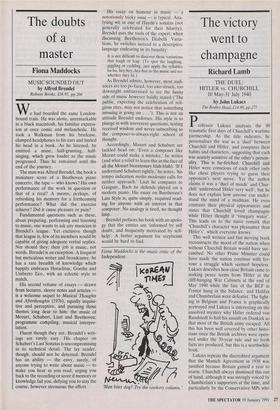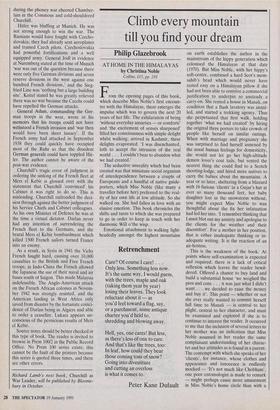The victory went to champagne
Richard Lamb
THE DUEL: HITLER vs. CHURCHILL 10 May-31 July 1940 by John Lukacs
The Bodley Head, £14.99, pp.275
Professor Lukacs analyses the 80 traumatic first days of Churchill's wartime partnership. As the title indicates, he personalises the war as a 'duel' between Churchill and Hitler, and compares their habits and characters, suggesting that each was acutely sensitive of the other's person- ality. This is far-fetched. Churchill and Hitler were conscious of each other only like chess players trying to guess their opponent's next move. Yet the author claims it was a 'duel of minds' and Chur- chill 'understood Hitler very well', but he does not explain how anyone can under- stand the mind of a madman. He even contrasts their physical appearances and states that Churchill loved champagne while Hitler thought it 'vinegary water'. This leads on to the naive remark that `Churchill's character was pleasanter than Hitler's', which everyone knows.
This well written and fast moving book reconstructs the mood of the nation when without Churchill Britain would have suc- cumbed. No other Prime Minister could have made the nation continue with fer- vour a struggle which seemed hopeless. Lukacs describes how close Britain came to seeking peace terms from Hitler at the cliff-hanging War Cabinets at the end of May 1940 while the fate of the BEF in France hung in the balance, and Halifax and Chamberlain were defeatist. The fight- ing in Belgium and France is graphically portrayed and Lukacs is interesting on the unsolved mystery why Hitler ordered von Rundstedt to halt his assault on Dunkirk so that most of the British army escaped. All this has been well covered by other histo- rians since the British archives were open- ned under the 30-year rule and no fresh facts are produced, but this is a worthwhile book.
Lukacs repeats the discredited argument that the Munich Agreement in 1938 was justified because Britain gained a year to rearm. Churchill always dismissed this out of hand, although it was strongly voiced by Chamberlain's supporters at the time, and particularly by the Conservative MPs who during the phoney war cheered Chamber- lain in the Commons and cold-shouldered Churchill.
Hitler was bluffing at Munich. He was not strong enough to win the war. The Russians would have fought with Czecho- slovakia; they had already sent aeroplanes and trained Czech pilots. Czechoslovakia had powerful fortifications and a well equipped army. General Jodl in evidence at Nuremberg stated at the time of Munich `war was out of the question because there were only five German divisions and seven reserve divisions in the west against one hundred French divisions,' and the Sieg- fried Line was `nothing but a large building site'. Keitel stated he was greatly relieved there was no war because the Czechs could have repelled the German attacks.
General Adam, commanding the Ger- man troops in the west, wrote in his memoirs that his troops could not have withstood a French invasion and `war then would have been sheer lunacy'. If the French army had attacked in September 1938 they could quickly have occupied most of the Ruhr so that the dissident German generals could have toppled Hit- ler. The author cannot be aware of the post-war evidence.
Churchill's tragic error of judgment in ordering the sinking of the French fleet at Mers el Kebir is glossed over with the statement that Churchill `convinced' his Cabinet it was right to do so. This is misleading. Churchill railroaded the deci- sion through against the better judgment of his Service Chiefs and Cabinet colleagues. As his own Minister of Defence he was at the time a virtual dictator. Darlan never had any intention of surrendering the French fleet to the Germans, and the brutal Mers el Kebir bombardment which killed 1500 French sailors turned France into an enemy.
As a result, in Syria in 1941 the Vichy French fought hard, causing over 10,000 casualties to the British and Free French troops; in Indo-China the French allowed the Japanese the use of their naval and air bases south of Saigon. This made Malaysia indefensible. The Anglo-American attack on the French African colonies in Novem- ber 1942 was strongly resisted, and the American landing in West Africa only saved from disaster by the fortunate coinci- dence of Darlan being in Algiers and able to order a ceasefire. Lukacs appears un- conscious of the pernicious results of Mers el Kebir.
Source notes should be better checked in this type of book. The reader is invited to browse in Prem 100/2 in the Public Record Office. No Prem 100 series exists; this cannot be the fault of the printers because this series is quoted three times, and there are other errors.
Richard Lamb's next book, Churchill as War Leader, will be published by Blooms- bury in October.



















































 Previous page
Previous page